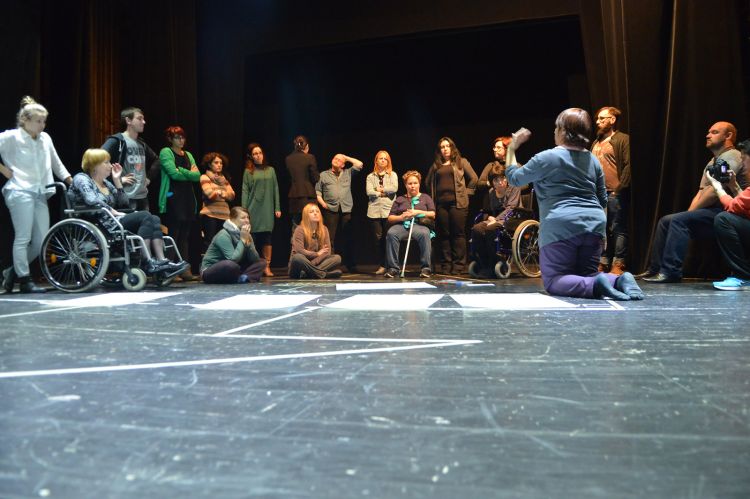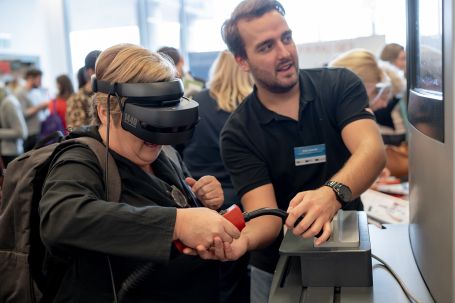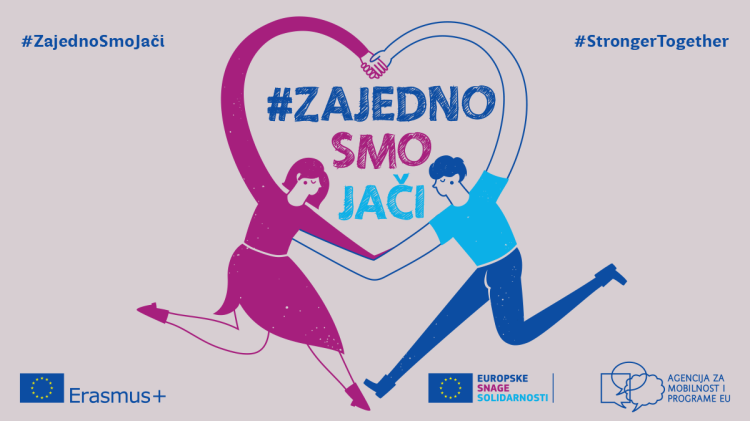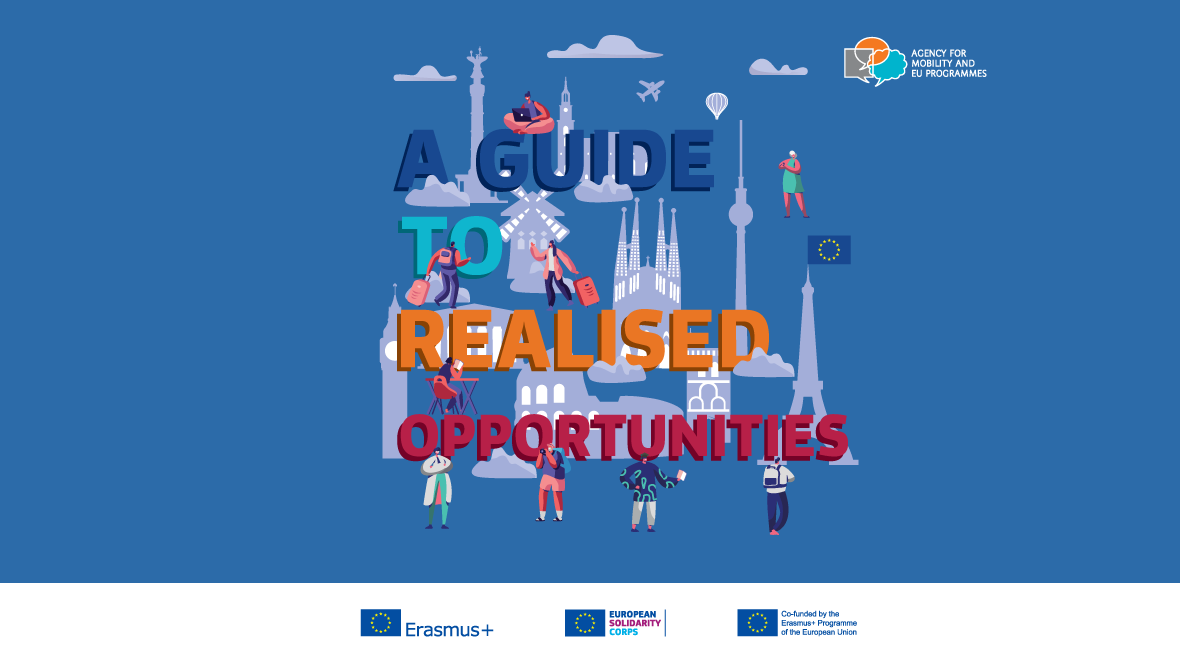
A Guide to Realised Opportunities
How Erasmus+ and European Solidarity Corps programmes helped us turn good ideas into projects that change society for the better.
Foreword
Dear readers,
I look forward to presenting the ‘Guide to Realised Opportunities’, which contains stories of successfully implemented projects by the Erasmus+ and the European Solidarity Corps programmes’ beneficiaries to you. From 2014 to the end of 2019, we funded 2,248 projects in the Republic of Croatia to the benefit of almost 47,000 Croatian citizens, 900 organisations and 741 domestic and foreign volunteers through these programmes. It was a very challenging task to select only 23 projects from among them that would tell the story of the opportunities and benefits of participating in these programmes and the impact it has on individuals, institutions and the community. We strongly believe that Erasmus+, as Europe's biggest programme for education, training, youth and sport – in line with its slogan – enriches lives and expands horizons, and that the European Solidarity Corps restores faith in the power of doing good, which improves interpersonal relations and society.
Good ideas and dedicated work give the best results
From 2014 to 2020, the Croatian Erasmus+ and the European Solidarity Corps programmes’ beneficiaries received almost EUR 159 million, i.e. more than HRK 1.17 billion in grants. This publication, true to its title, presents the opportunities offered by Erasmus+ and the European Solidarity Corps programmes, and we hope that the successful beneficiaries’ experiences will inspire you to implement new ideas. Aware of the dynamic times in which we live, our beneficiaries, with the help of financial resources from Erasmus+ and the European Solidarity Corps programmes, have dared to gain new knowledge and experiences, address the daily challenges and strengthen the capacities for the future. Some of them are already seeking answers today to some of the future challenges.
In the following stories, you will learn that programming can already be taught in kindergarten, how technological solutions and the creativity of teachers and headmasters can make the curriculum interesting and stimulating for pupils, and how vocational education can produce attractive occupations and align with the needs of the labour markets. To be focused on the growth and development of institutions and their internationalisation, international cooperation and experiences are needed that are able to contribute to good solutions to the local and regional challenges we face. With the largest European youth work project, ‘Europe Goes Local’, all local and regional government units have been given the opportunity to improve youth work in their communities, and the youth have gained the chance to be actively involved in the life of the community.
European Solidarity Corps preserve social values
As the youth are the cornerstone of a more prosperous future, the European Solidarity Corps programme has provided them with the opportunity to discover and enhance their potential and to actively participate in the democratic processes within their communities as well as lead positive changes. Participation in volunteering and solidarity projects teaches them social values such as human rights, pluralism, tolerance, solidarity, justice, equality and sustainable development. Since its launch in 2018, the European Solidarity Corps has grown into one of the EU's flagship initiatives, giving the youth the opportunities to help where it is needed and at the same time gain valuable useful experience for their entire life.
Erasmus+ has enriched the lives of 10 million Europeans
The Erasmus+ programme and its predecessors are among the most successful EU programmes. Since 1987, students have been able to acquire new knowledge and experience by going abroad for traineeships or study. In the meantime, Erasmus+ has expanded its activities to all fields of education, youth and sport, and the current 10 million beneficiaries are the best proof of its widespread acceptance among Europeans. It is believed to be one of the most concrete achievements of the European Union because it unites and connects people, expands horizons and disseminates knowledge. In the seven years, from 2014 to 2020, beneficiaries across the EU had EUR 14.7 billion at their disposal to implement their projects.
We sincerely thank and congratulate all beneficiaries who have successfully used the funds available. They are our best ambassadors because their persistent efforts and hard work in the implementation of projects are part of the successful national statistics in terms of participation. Almost 99% of the grants were contracted and nearly 97% used.
We believe that this publication will inspire you to participate in Erasmus+ and the European Solidarity Corps programmes, which provide an opportunity to find ideas and partners for professional growth. They bring new knowledge, skills, self-confidence and cultural experiences to pupils and students, and provide volunteers with the opportunity to promote the joint activities and progress of individuals and the community through charity work for the common good. Get inspired by the stories of the realised opportunities, dare to create your own, and the Agency for Mobility and EU Programmes will support you in this.
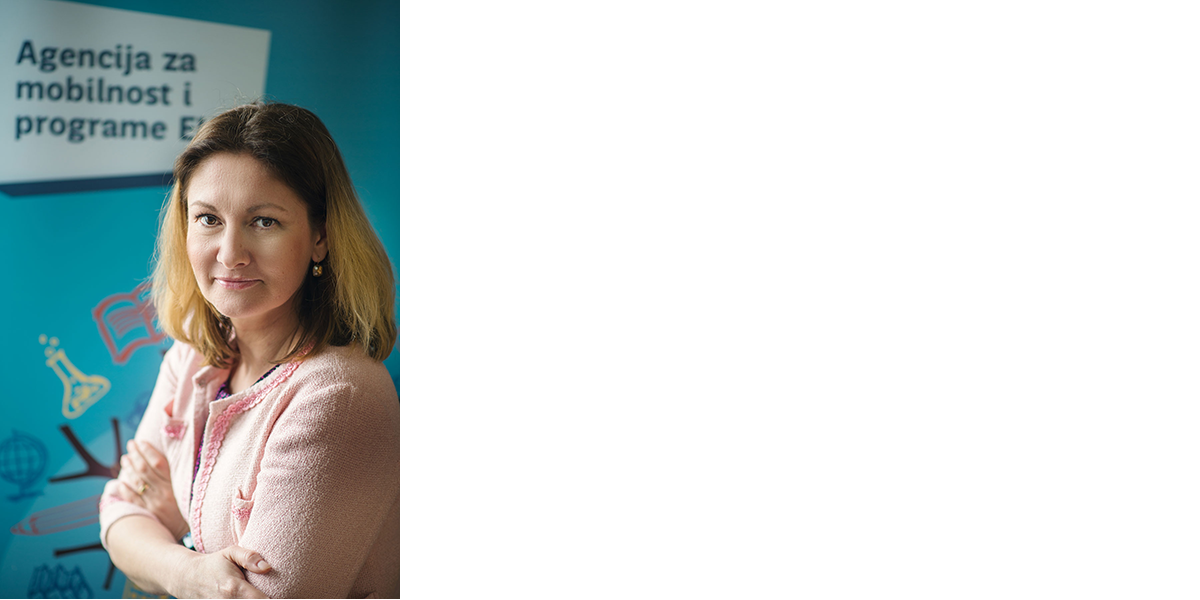
Antonija Gladović, MSc, director of the Agency for Mobility and EU Programmes
HRK 1.17 billion
In the period from 2014 to the end of 2020, under the Erasmus+ and European Solidarity Corps programmes, Croatia received EUR 158.63 million, i.e. more than HRK 1.17 billion in grants.
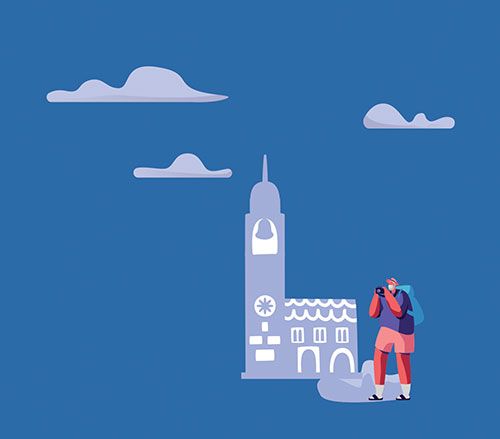
HRK 1.14 billion
For Erasmus+ projects, grants worth HRK 1.14 billion were awarded in the period from 2014 to the end of 2020.
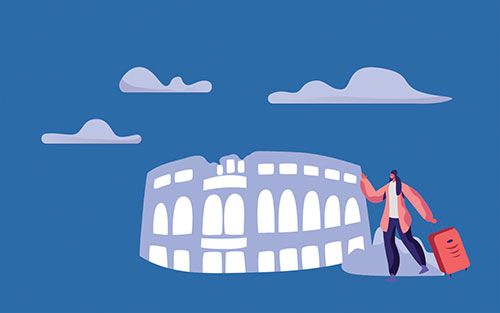
HRK 30.68 million
From 2018 to 2020, HRK 30.68 million in grants were awarded to projects under the European Solidarity Corps in Croatia.
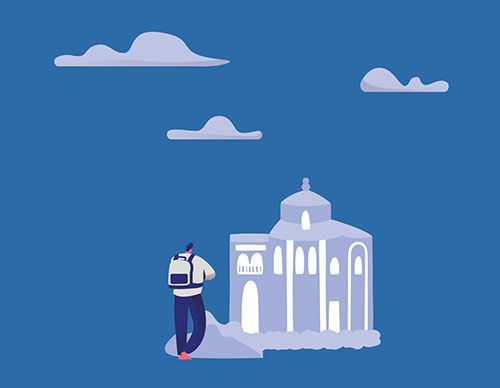
10 million Erasmus+ beneficiaries
When it was first launched as the Erasmus programme back in 1987, only 11 countries participated, i.e. Belgium, Denmark, Germany, Greece, France, Ireland, Italy, the Netherlands, Portugal, Spain and Great Britain, and in the first year only 3,244 students participated in mobility activities under the Erasmus programme. Meanwhile, the programme spread across 34 countries – all EU member states, Great Britain, Turkey, the Republic of North Macedonia, Norway, Iceland, Liechtenstein and Serbia. Erasmus+ is one of the most well-known European brands open to partner countries around the world with 10 million people participating by 2019.
HAVING MORE OPPORTUNITIES THROUGH INCLUSION
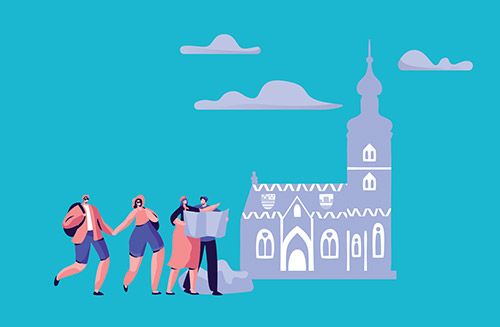
For a better life with sign language
The lack of sign language users, as well as translators, further isolates deafblind persons, one of the most vulnerable groups of people with disabilities due to their double sensory impairment – visual and hearing impairment. For 25 years the Croatian Association of Deafblind Persons ‘Dodir’ has been providing for the deafblind and has prepared and published the first textbook about learning Croatian sign language. Mostly native speakers, i.e. deaf and deafblind persons, teach the learners sign language in a course at ‘Dodir’, however, there is no formal education for them in Croatia.
Therefore, seven sign language instructors at ‘Dodir’, including three deafblind and one deaf person, participated in the job-shadowing activities of foreign colleagues and courses in the framework of a one-year project named ‘Equal opportunities and quality in the provision of educational services for adults in the field of sign language’. The project was implemented together with the Finnish Deafblind Association, which has lots of experience in the field of sign language teaching.
The instructors at ‘Dodir’ learned how to organise classes, conceptualize courses, practical exercises with learners, and use technology in teaching. They shared their acquired knowledge with colleagues running courses at local associations in Split, Osijek, Varaždin and Čakovec and began creating a new sign language learning curriculum. A collaboration with the association named ‘iLab’, which has developed an application to help children learn sign language resulted from raising the public’s awareness about deafblindness. Learning Croatian sign language and other communication systems of the deafblind and deaf is very important for their inclusion in the community. The early exposure to sign language for young children is crucial for the successful adoption of the language, and likewise for the regular cognitive, emotional and social development and overall achievement of a child.
|
Project ID |
|
|
Beneficiary |
Croatian Association of Deafblind Persons ‘Dodir’ Zagreb |
|
Project title and project number |
Equal opportunities and quality in the provision of educational services for adults in the field of sign language, 2017-1-HR01-KA104-034938 |
|
Programme field |
Erasmus+ KA1 Learning mobility of individuals in adult education |
|
Budget |
EUR 19,405 |
|
Implementation |
2 June 2017-1 June 2018 |
|
Link |
|
‘There is no formal education for sign language teaching, so it is difficult to keep up with the new methods and technologies. My first experience with the Erasmus+ programme enriched me in every sense. I rarely get opportunities for professional development as a deaf person, however, in this project, I got the chance to learn from the best – colleagues from the Finnish education system. New working and teaching methods increase the number of learners in a course, and a greater number of sign language users helps reduce the exclusion of deafblind persons – our end beneficiaries.’
Ana Jakopović, Croatian sign language instructor
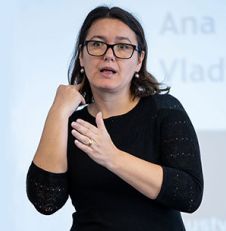
I rarely get opportunities for professional development as a deaf person, however in the Erasmus+ project I got the chance to learn from the best – colleagues from the Finnish education system, says Ana Jakopović.
Fighting prejudice and discrimination through theatre
In order to enhance the employment of people with fewer opportunities through Educational Theatre, the Association for Prevention of Stigmatization and Education through Theatre – UPSET, in collaboration with seven international partners from six European countries, has started a strategic partnership project named ‘Educational theatre as the place of raising inclusion and employability of people with disability – Educathe+’.
Through sharing experiences and participating in international workshops based on a drama-action model, together they explored the obstacles that people with fewer opportunities face in the labour market and social life. Each exploration ended in a public performance in order to raise the awareness of participants about the explored problem and to present positive actions that could solve this problem. In eight international education-artistic workshops, numerous documentary videos and guides were created. Likewise, out of the 132 mobility activities, 33 included persons with fewer opportunities.
By attending the workshops, people with fewer opportunities underwent a symbolic initiation and gained new insights, and by switching the roles, they were also given the opportunity to understand people who they avoid or don’t understand in everyday life. After the public performance, while discussing with the audience, some of the persons with fewer opportunities highlighted the positive impact of acting on their psychophysical state.
‘The project participants emphasised the positive impact of this method, so each of the eight partners organised their own version of the drama-action workshop. After each workshop, an Educathe+ guide was developed so that other educators and all interested parties were able to organise their own workshops based on the Croatian model. ‘A comprehensive Educathe+ guide for educators” has been created after the project finished’, sociologist Ivan Hromatko, PhD, stated. In his PhD thesis, he developed a drama-action method which combines the benefits of sociology with the benefits of theatre, non-formal education and civic activism in order to drive positive change in society.
|
Project ID |
|
|
Beneficiary |
UPSET Zagreb |
|
Project title and project number |
Educathe +, 2015-1-HR01-KA204-013053 |
|
Programme field |
Erasmus+ KA2 Strategic partnership in adult education |
|
Partners |
ARATOS (Greece); O.C.E.A.N NGO (Greece); AKDENIZ (Turkey); TSVETE (Bulgaria); ADM (Italy); DE ZEYP (Belgium); I+I (Latvia) |
|
Budget |
EUR 176,455.72 |
|
Implementation |
2015-2017 |
|
Link |
|
‘The Educathe+ project is truly remarkable as it manages to sensitise the public to the problems faced by people with disabilities and to educate participants who will share their experience with others, and thus remove barriers in their own surroundings. The idea of art as a driving force that makes us connected to ourselves and the world around us is also important. By participating in this project, I realised again how much discrimination can be painful to those who face it, and how important it is to give a person the chance to feel a part of the community, to participate in its life and to contribute to its prosperity, but also to constantly push one’s own boundaries.’
Annabel Domović, UPSET Association
Educational theatre helps to sensitise the public to the problems faced by people with fewer opportunities.
Erasmus+ enables more opportunities
The inspiring story of a young 22-year-old visually impaired student, Antonio Vicković, shows how important inclusion is in empowering young people with fewer opportunities. Antonio applied for a ten-day international mobility activity in Riga in 2014, although at first he had some doubts. This mobility experience encouraged him to participate regularly each year in mobility activities, and each time in a different country..
In the framework of the Erasmus+ project ‘Mobility, Education, Communication’, in 2018 the Up2Date Centre organised one such international mobility activity in Zadar together with partners from 17 foreign countries. More than 50 young visually impaired people participated in the mobility activity, and due to his participation, Antonio was promoted from being just a participant to being the leader of the Croatian Youth Group.
He too faced the challenge of getting out of his safe micro-world, plucking up courage, and began a journey among strangers. However, he overcame his fears, applied, and discovered that he could do much more than he previously thought. After that, he continued to participate in the activities and today he says that he is a new man and that he is completely independent.
As Antonio’s example best shows, such projects are invaluable for the life quality of youth with fewer opportunities and they have a very positive impact on their inclusion in society. Apart from having a positive impact on individuals, the project also has an impact on the local community. The locals met many blind and partially sighted young people in one place, which helps overcome prejudice about those who are different. Traffic signs adapted for the visually impaired were installed or improved in some locations in Zadar because of this project. Likewise, an open day was organised where the public were able to participate in the activities. In 2019, the Agency for Mobility and EU Programmes presented an award to the Up2Date Centre for the most inclusive project in 2016-2018.
|
Project ID |
|
|
Beneficiary |
Up2Date Centre Zagreb |
|
Project title and project number |
Mobility, education, communication, 2018-1-HR01-KA105-047317 |
|
Programme field |
Erasmus+ KA1 Learning mobility of youth |
|
Budget |
EUR 43,856.19 |
|
Implementation |
2018 |
|
Link |
|
‘I am not afraid to think about the workplace being so far away from my parents. I am not afraid of not knowing about some other culture, customs, language because I have experienced diversity and learned how to adapt, how to overcome differences. I know there is a way and I just need to want it.’
Antonio Vicković, Up2Date Centre
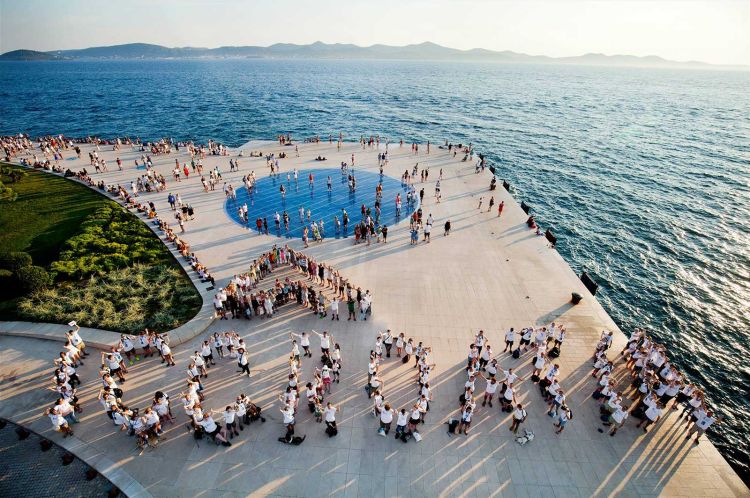
An ICC Camp (International Camp on Communication and Computers) was held in Zadar in 2018 to help young people develop IT, communication and social skills.
EUR 14.7 billion
For the seven-year period from 2014 to 2020, the total Erasmus+ programme budget for the participating countries amounts to EUR 14.7 billion
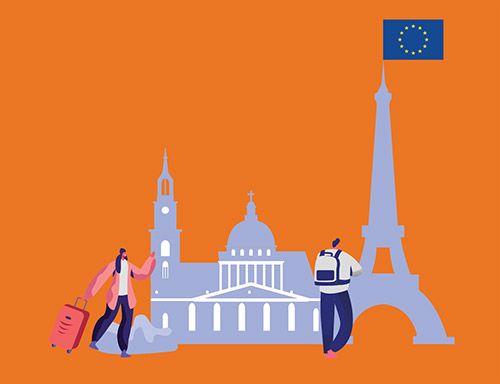
According to the citizens, the three most positive results of the European Union are:
1) the free movement of people, goods and services
2) peace among the Member States
3) Erasmus+
Eurobarometer, spring 2019
Erasmus+ is not a programme solely for university students and staff; it is also for pupils and staff in vocational education, youth and youth workers and adult education staff. The partnership projects are useful for teachers and school staff as well as their pupils, and recently educators and kindergarten children have been enthusiastic beneficiaries of the Erasmus+ programme.
INNOVATIVE AND CREATIVE EDUCATION

Erasmus+ connected the two worlds of business and design the best
The Erasmus+ project ‘Practicing Design’ is a collaborative project including three European professional design organisations, two educational institutions and two companies.
The aim of the project was to establish new and innovative design practices in education to bridge the gap between education and professional work, and to improve the skills of the designers required for the existing socio-economic situation. ‘Practicing Design’ promotes innovative education and training practices at national, regional and international levels in order to raise awareness among all stakeholders. At the same time, it points out to the general public the required improvement in the quality and the importance of the current forms of the education and training of designers and the necessary links to the world of practice.
The first project phase resulted in the study ‘Rethinking Design Education’. It contains the skills and knowledge needed for greater designer employability that are not provided by the current design curricula. Therefore, guidelines were created identifying the main challenges facing the design practice and education in the 21st century based on an empirical study of the existing needs and skills mismatch in the design curricula in Croatia, Austria and the Republic of North Macedonia. The study served as a framework for the result of the second project phase: the ‘Practicing Design 1.0’ training programme. A complementary guide was also developed that combines interdisciplinary and entrepreneurial skills in educational workshops, fosters collaboration projects among young designers, design and business teachers and companies in the sector of industrial production.
Ivana Borovnjak, from the Croatian Designers Association, highlights that the project involved young designers in the process of product creation and cooperation with the manufacturing sector. In this way, they were given the chance to learn from mentors of different expertise and to go through the whole process of product creation from the concept, through production, to promotion.
|
Project ID |
|
|
Beneficiary |
Croatian Designers Association, Zagreb |
|
Project title and project number |
Practising design, 2014-1-HR01-KA203-007203 |
|
Programme field |
Erasmus+ KA2 Strategic partnership for innovation and the exchange of good practices in higher education |
|
Partners |
designaustria (Austria); Public Room (the Republic of North Macedonia); University of Applied Sciences VERN’ (Croatia); Faculty of Arts and Design, European University of the Republic of North Macedonia); Prostoria d.o.o. (Croatia) and Zavar d.o.o. (the Republic of North Macedonia) |
|
Budget |
EUR 199,582.33 |
|
Implementation |
2014-2017 |
|
Link |
|
‘Due to the project, some of the participants made their first public appearance at the Gallery of the Croatian Designers Association and at the Exhibition of Croatian Design 1718 at which the project received a special award in the category of Concept, Initiative, Critical Design. This has made office furniture prototypes produced in collaboration with the company Prostoria more visible to the general public.’
Ivana Borovnjak, Croatian Designers Association
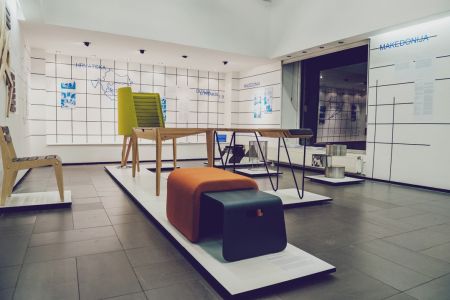
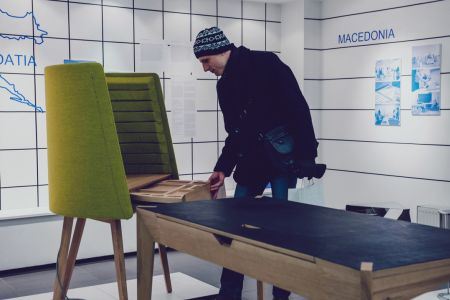
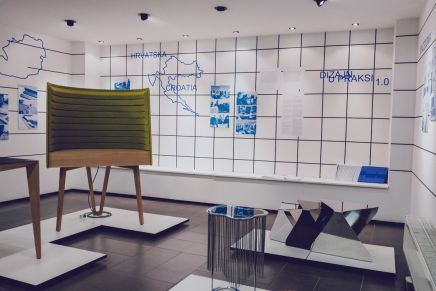
Exhibitions of prototypes created at the ‘Practicing Design’ workshops.
Historical mysteries preserve cultural heritage
During the two-year school partnership project ‘Mystery of History’ at the Kraljica Jelena Primary School in Solin, 1,500 participants made learning history into a real treat. Pupils aged 7 to 11 from two Italian, one Slovenian and two Croatian schools participated in 12 interesting activities that led them into ancient history – they played old games, practised archaeology, studied artworks, tried recipes, put together ancient mosaics but also learned about digital tools, made films, wrote pieces of news and feature stories. The project is a follow-up to the successful eTwinning project ‘Little Curators’ implemented by the Kraljica Jelena Primary School with the aim to make history a more interesting subject.
The project was successful, which was demonstrated by the valuable recognition it received during the European Year of Cultural Heritage in 2018. The ‘Mystery of History’ project was selected by the European Commission's Directorate General for Education and Culture as an example of European good practice in preserving cultural heritage.
The pupils learned about and explored the historical, cultural and natural heritage of their region through fieldwork at three selected historical and natural sites. It was a comprehensive research teaching which included lots of practical work, critical thinking and materials posted on the project website in order to make it accessible to anyone interested. Although many imaginative activities were included in the project, some of them were created spontaneously during the project’s implementation. For example, finding out about local legends resulted in a picture book and a new eTwinning project, children's artwork created during the project was displayed on Museum Night in each country, and educational crossword puzzles, riddles, mazes and brain-teasers made by pupils were also solved by parents.
Thanks to the incentives of creative, imaginative and enthusiastic teachers, the pupils participated in creating the project’s activities, and in some activities, the whole local community was involved. The teachers who participated in the project gained new knowledge, motivation and new enthusiasm. The teaching was updated, the school cooperates better with the local community, and pupils have acquired the skills for the future by learning history.
|
Project ID |
|
|
Beneficiary |
Kraljica Jelena Primary School, Solin |
|
Project title and project number |
Mystery of History, 2017-1-HR01-KA219-035383_1 |
|
Programme field |
Erasmus+ KA2 Strategic partnerships for schools |
|
Partners |
Primorski Dolac Primary School (Croatia); School Centre I.C.S. ‘Alda Costa’ (Italy); School Centre VIII Circolo (Italy); Mladika Primary School (Slovenia) |
|
Budget |
EUR 10,650 |
|
Implementation |
2017-2019 |
|
Link |
|
‘It is a well-known fact that we live in a digital age and that our pupils have digital knowledge and become acquainted with digital content from an early age. However, it is also necessary to educate them in this field and to guide them in the proper use of ICT technology. With this approach, the old, historical and seemingly unattractive contents were made attractive and very interesting to our pupils, because they relate to the contemporary and up-to-date digital content familiar to a child.’
Nives Bogdan, the teacher and project coordinator
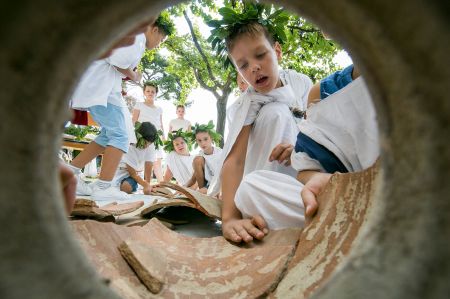
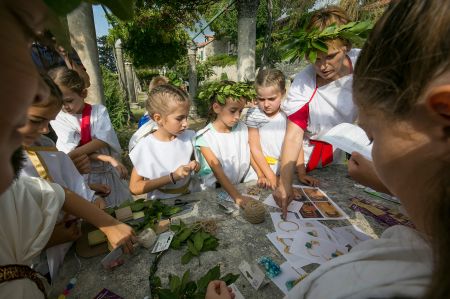
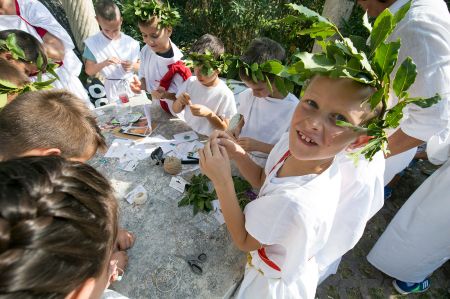
During the project, pupils played old games, practised archaeology, studied artworks, tried recipes, put together ancient mosaics.
Virtual reality turned welding into a popular profession
In 2016 Željko Habek, a mechanical engineer, retired teacher of the Industrial and Crafts School in Slavonski Brod and the president of the Association for Lifelong Vocational Education Struka due to his explorer spirit, great perseverance and enthusiasm, together with the Uljanik College started a project that popularised welding among pupils.
The project named ‘Welding is your chance’ has been implemented in the framework of the Erasmus+ programme and because of its exceptional results was declared an example of good practice on the European level. Due to its long-term positive impact, the Ministry of Science and Education has started to apply the project results to the Croatian education system. Therefore, a standard of occupation and a standard of qualification for the profession of an arc welder are currently being developed.
The new generations accepted the project very well because it uses new technologies, i.e. virtual reality, as an effective teaching method. The project has been presented in 45 countries to the representatives of five continents. Therefore, not surprisingly, the project implementation received the highest score – 100/100.
The ‘Welding is your chance’ project has resulted in a digital platform for welders with a new teaching methodology that has been integrated into the European Curriculum Framework for Electrical Arc Welders. Respectable organisations from European countries participated in the project, and one of the partners was the European Welding Federation (EWF).
‘With this project, we have trained and employed around 40 welders. Slavonski Brod is a leading example, and at the Industrial and Crafts School in Slavonski Brod, a ranking list is being created for the enrolment into the education programme for welders – 120 pupils apply each year for one class. This situation is good for the shipping industry, i.e. the Đuro Đaković industrial group,’ says Željko Habek, a project coordinator, who also worked for quite some time at Đuro Đaković. During the project’s implementation, using virtual welding technology for the first time in the world, at one of the partners – the company Končar Metal Structures, the working technique of professional welders was corrected.
|
Project ID |
|
|
Beneficiary |
Uljanik College – Pula, (Struka Association for Lifelong Vocational Education – Slavonski Brod continues to use the projects’ results) |
|
Project title and project number |
Welding is your chance, 2016-1-HR01-KA202-022187 |
|
Programme field |
Erasmus+ KA2 Strategic partnership for innovation and the exchange of good practices in VET |
|
Partners |
ASOCIACION ESPANOLA DE SOLDADURA Y TECNOLOGIAS DE UNION (Spain); Industrial and Crafts School (Croatia); IIS Progress s.r.l. (Italy); EUROPEAN FEDERATION FOR WELDING JOINING AND CUTTING (Belgium); Končar – Metal Structures d.d. (Croatia) |
|
Budget |
EUR 155,422 |
|
Implementation |
2016-2018 |
|
Link |
|
‘When we applied for the call announced by the Agency for Mobility and EU Programmes, we barely got a pass mark and ended up on the reserve list. As the ones who were before us on the list gave up, we seized the opportunity. We have adopted all the evaluators’ comments and have worked hard for two years to implement the project. We have demonstrated that persistence pays off, and the opportunity that is given should be used in full.’
Željko Habek, Struka Association
Learning how to operate the virtual welding machine.
Handbook for reluctant, struggling and poor readers
‘I don't enjoy reading at all’ or ‘I hate reading and I almost never do it’ were the replies of about 10% of respondents between 15 and 18 to a survey about reading habits conducted under the project of the ‘Ivan Supek’ 10th Grammar School in Zagreb. At this age, pupils lose a bit of interest in reading. Therefore, the two-year project of the grammar school which produced the Handbook for Reluctant, Struggling and Poor Readers is intended specifically for them.
This strategic partnership for innovation in education brought together six partners from the Czech Republic, Italy, Slovakia and Croatia. They found literacy to be a key part of each person's right to education and have therefore found several solutions and strategies. During the two years of the project worth EUR 144,148, they conducted research, prepared a handbook, an innovative curriculum and a digital classroom together with a teacher's handbook. All are valuable intellectual results. They understood the needs of reluctant, struggling and poor readers and tried to improve their reading skills by assisting them in strengthening their confidence and belief in their own abilities as well as in overcoming their lack of personal motivation.
The publicly available handbook, which has been, among other project results, published on the project's website, contains a set of attractive texts that arouse the interest of reluctant readers with methodological instructions for reading. The pupils' interest is aroused by strategies adapted to their abilities and interests, and the inclusion of pupils in the educational process reduces their chances of non-participation.
On 20th October 2017, on the radio show ‘Science and Society – I love Plato’, a pupil of the 4th grade of the ‘Josip Slavenski’ Grammar School in Čakovec said that she used to read one poem at least five times to understand it, and now only one reading suffices for a better understanding. Thanks to the project, she was able to develop a strategy that helps her focus better on reading without her thoughts wondering elsewhere. The school in Čakovec was one of many Croatian schools whose pupils and teachers participated in the survey collecting data about the reading problems of secondary school pupils.
|
Project ID |
|
|
Beneficiary |
The ‘Ivan Supek’ 10th Grammar School in Zagreb |
|
Project title and project number |
Handbook for Reluctant, Struggling and Poor Readers (H4RSP), 2016-1-HR01-KA201-022159 |
|
Programme field |
Erasmus+ KA2 Strategic partnership in school education |
|
Partners |
The P.J. Šafárik Language School (Slovakia); Liceo Scientifico ‘G.Seguenza’ School (Italy); Náhorní Secondary School (the Czech Republic); Education and Teacher Training Agency (Croatia); Aquilonis d.o.o. (Croatia) |
|
Budget |
EUR 144,148 |
|
Implementation |
2016-2018 |
|
Link |
|
‘In the project Handbook for Reluctant, Struggling and Poor Readers literacy is considered to be a key part of each person's right to education. The right to literacy in this project is actually the right to support: no one with literacy problems should tackle this problem alone.’
Jelena Crnek, Croatian language teacher and H4RSP project coordinator
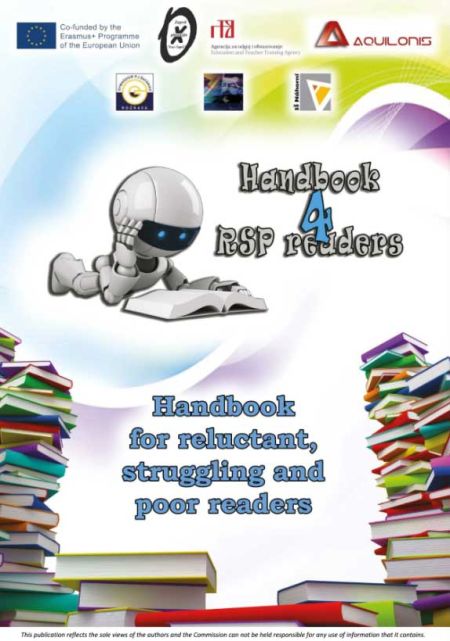
Pupils' interest in reading is aroused by strategies adapted to their abilities and interests.
2248 Erasmus+ and European Solidarity Corps projects
From 2014 to the end of 2019, Croatian beneficiaries participated in 2,190 Erasmus+ and 58 European Solidarity Corps projects.
46.371
Erasmus+ mobilities
with the aim of learning, professional development and training, the exchange of knowledge and experience and job shadowing.
The results of the Erasmus+ Impact Study on Higher Education and the Erasmus+ Strategic Partnerships and Knowledge Alliances Study in Higher Education have shown that Erasmus+ helps students to be more successful in their personal and professional lives and universities to be more innovative. The Impact Study on Higher Education also found that 80% of alumni found a job within three months of graduation, and 72% said that experience abroad helped them get their first job. More than 90% of students who participated in the Erasmus+ programme also improved their ability to work and cooperate with people from different cultures.
LEARNING ERASES BORDERS AND PRESENTS OPPORTUNITIES
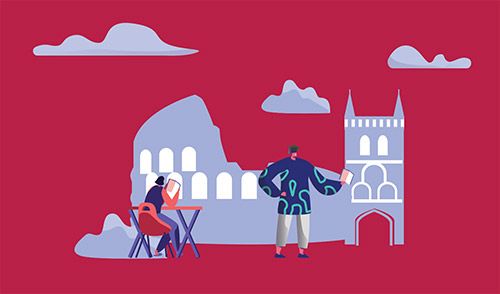
A click away from entrepreneurial skills
The answers to the questions of how to encourage youth entrepreneurship and reduce long-term unemployment through free online tools are offered by a two-year strategic partnership project called ‘Student Business e-Academy’ (SBeA). The University of Split started the project together with partners from Spain and Great Britain in 2015.
A free, adaptable online SBeA programme has been developed in order to foster the entrepreneurial skills of young people and all those interested in entrepreneurship. It is accessible to everyone on the e-platform. The online programme contains a digital start-up game and a guide for entrepreneurs in three languages, which provides guidelines on how to start a business.
‘Not everyone has entrepreneurial skills, but those who have them have shown great interest in our programme. The students embraced the project very well. The students of information and communication technologies, chemistry, economics as well as students from the Faculty of Philosophy, who want to start a business related to pre-school education, are the most interested in the programme’, said Aleksandra Banić, the project coordinator. In addition to being important for the development of entrepreneurship, the SBeA programme should help end long-term unemployment in Croatia.
Ivana Perić, who graduated in economics, was one of the successful participants of the SBeA programme. Today, she is the owner of the small OPG Miletić – SPARA family farm that produces innovative food products. They produce preserved cakes with olive oil and hand-chopped dried fruits, foods with high-energy values and jams. It was the theoretical, and primarily the practical knowledge she acquired by participating in the programme that helped her immensely and assisted her in starting her entrepreneurial story, Ivana says. So, she continues to collaborate with the Student Business Incubator at the Faculty of Economics in Split that initiated this project and regularly helps students in implementing their entrepreneurial ideas.
|
Project ID |
|
|
Beneficiary |
The University of Split |
|
Project title and project number |
Student Business e-Academy(SBeA), 2015-1-HR01-KA203-013080 |
|
Programme field |
Erasmus+ KA2 Strategic partnership in higher education |
|
Partners |
Middlesex University (Great Britain) and University of Malaga (Spain) |
|
Budget |
EUR 222,821.84 |
|
Implementation |
2015-2017 |
|
Link |
|
EUROPEAN UNIVERSITIES
The University of Split has, due to its focus on international cooperation and finding innovative solutions to the challenges of today, in addition to the successful implementation of the Erasmus+ strategic partnership, also joined selected higher education institutions participating in the European Universities initiative. As part of European Universities Alliances, the students will continue to develop high-quality academic, innovative and entrepreneurial surroundings, and ensure that knowledge is passed on to society through different activities. Specifically, in the project called European University of the Seas (SEA-EU), the University of Split has an important role of a lead partner in finding solutions that involve the university and the public and business sectors with an emphasis on social and environmental responsibility. We are proud that besides the University of Split the following universities are also in selected European University Alliances: the University of Zadar is part of the European University for Smart Urban Coastal Sustainability (CONEXUS), the University of Rijeka is part of the alliance Young Universities for the Future of Europe (YUFE) and the University of Zagreb is part of the alliance European University of Post-Industrial Cities (UNIC).
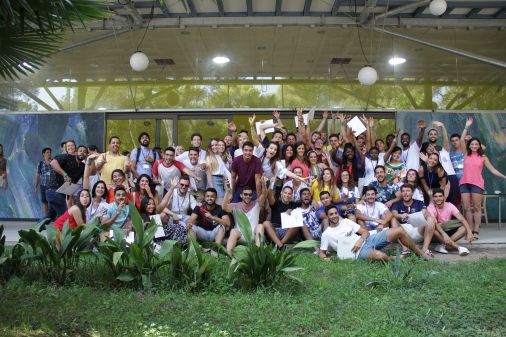
Međunarodni timovi zajedno su 2017. godine u Pakoštanima razvijali projekt SBaA.
The scientific response to change quicker than the shift of generations
The students at the Faculty of Electrical Engineering and Computing in Zagreb are aware that in today’s world change is happening quicker than the shift of generations. Therefore, they are focusing on finding innovative solutions based on information and communication technologies (ICT). One of the success stories at the Faculty of Electrical Engineering and Computing is a two-year strategic partnership project called ‘Innovative ICT Solutions for the Societal Challenges’ – INNOSOC that began in 2015 and was labelled by the European Commission as a ‘success story’ based on the criteria of quality, relevance and achieved results.
This project encourages international strategic networks of students and teachers, faculties and industry and the use of modern technology with the aim to enhance and internationalise education. Faculties of technology in eight European countries are participating in finding innovative solutions based on ICT.
The participants of this project emphasise the multiple benefits for partner universities, thanks to the popularisation of ICT-based innovations, the promotion of student mobility and the better cohesion between education and the labour market. Furthermore, the project has also given students and teachers the opportunity to collaborate with hundreds of excellent academics and to enhance skills and competences such as practical problem-solving and working in multicultural teams. At the same time, the project popularises STEM areas among primary and secondary school pupils through workshops and presentations and contributes to the dissemination of knowledge at the EU and national level by using all available multilingual education resources such as innovation and ICT case studies and lectures in the framework of INNOSOC project themed on the major societal challenges of today.
Among the social challenges for which strategic partners in the INNOSOC project are seeking solutions are: ecology, sustainable development, smart transport and inclusive innovative and safe societies. Project coordinator Assoc. Prof. Vedran Podobnik, PhD, highlights that time has become one of the most valuable assets of today in regard to the many stimuli and information we are exposed to.
|
Project ID |
|
|
Beneficiary |
Faculty of Electrical Engineering and Computing, University of Zagreb |
|
Project title and project number |
Innovative ICT Solutions for the Societal Challenges (INNOSOC), 2015-1-HR01-KA203-013124 |
|
Programme field |
Erasmus+ KA2 Strategic partnership in higher education |
|
Partners |
University Ziline (Slovakia); University Debrecen (Hungary); Polytechnic University Valencia (Spain); University Oradea (Romania); College of Telecommunications and Post (Bulgaria); HfTL – University of Applied Sciences Leipzig (Germany); Technical University of Košice (Slovakia); Technical University of Sofia (Bulgaria); Széchenyi István University (Hungary); IMT Atlantique Bretagne Pays de la Loire (France) |
|
Budget |
EUR 203,365 |
|
Implementation |
2015-2017 |
|
Link |
|
‘Collaborating in the project, I have acquired professional, scientific and teaching skills that helped me began a successful career as an independent researcher at the Faculty of Electrical Engineering and Computing.’
Assoc. Prof. Jurica Babić, PhD, Faculty of Electrical Engineering and Computing
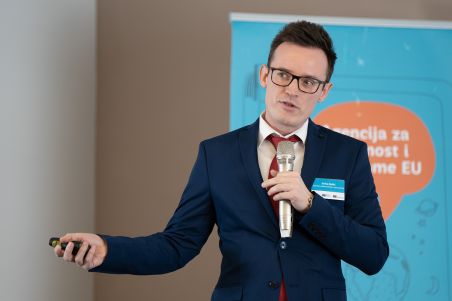
Jurica Babić, PhD
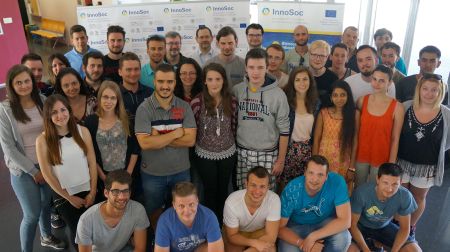
Faculties of technology in eight European countries are participating in finding innovative solutions based on ICT.
How the little get big through Erasmus+
The Bjelovar University of Applied Sciences has demonstrated in an excellent way how a small higher education institution can enhance its academic capacity. Since 2014, the Bjelovar University of Applied Sciences has been successfully implementing student and staff mobility projects under the Erasmus+ programme. Through these projects, the Bjelovar University of Applied Sciences enhances teaching processes, contributes to the development of individuals' skills, strengthens HEIs internationalisation and ensures the transfer of knowledge and good practice through cooperation with national and European partners. Likewise, the number of international students enjoying the benefits of the academic and cultural life in Bjelovar is increasing, which further strengthens international cooperation and enriches the local community.
‘Staff mobility is extremely important for the overall international cooperation development of our university of applied sciences. The active and meaningful participation of staff in mobility activities has resulted in concluding new bilateral agreements, which has opened up new opportunities for student mobility and exchange of good practices with foreign partner institutions. ‘As a best practice example, we highlight the participation of the Faculty of Nursing’s staff in the International Staff Week organised by the University School of Medicine in Sofia, with which our University of Applied Sciences has signed a bilateral agreement and achieved further outgoing and incoming mobilities of students and staff’, says Ivana Jurković, Erasmus+ programme coordinator, highlighting the achievements of the Bjelovar University of Applied Sciences. This university provides three study programmes: mechatronics, nursing and computer science.
Erasmus+ programme traineeships have proven to be an ideal way to enhance student employability and competitiveness after graduation, emphasised Ivana Jurković. For example, during a three-month traineeship in Barcelona, a third-year nursing student Andrea Čeh worked every other day for 12 hours in the burns ward, perfecting all work phases, from emergencies to the operating room.
As an example of the Erasmus+ traineeship that led a student to entrepreneurial business, I. Jurković highlights the case of a mechatronics’ student Sebastian Kos who, owing to his traineeship experience in Graz, opened his own company. During his traineeship in Graz, the employer offered Sebastian a job, which he had to turn down because he decided to return to Bjelovar and complete his studies. After graduation, he accepted the business offer from the Austrian employer and worked for him for three years. He used his gained knowledge and skills to set up his own company in Bjelovar, and used his contacts to expand his business beyond Croatia.
|
Project ID |
|
|
Beneficiary |
Bjelovar University of Applied Sciences |
|
Project title and project number |
Good practice examples of mobility projects: 2017-1-HR01-KA107-035084 and 2017-1-HR01-KA103-034972 |
|
Programme field |
Erasmus+ KA1 Learning mobility of students and staff |
|
Budget |
2017-1-HR01-KA107-035084: EUR 8,290 2017-1-HR01-KA103-034972: EUR 20,278 |
|
Implementation |
2017 |
|
Link |
|
‘I continued my cooperation with the Austrian partner through my company, and owing to the business contacts I participate in an international project in which the end buyer is BMW.’
Sebastijan Kos, the young entrepreneur whose participation in Erasmus+ opened a door to global business
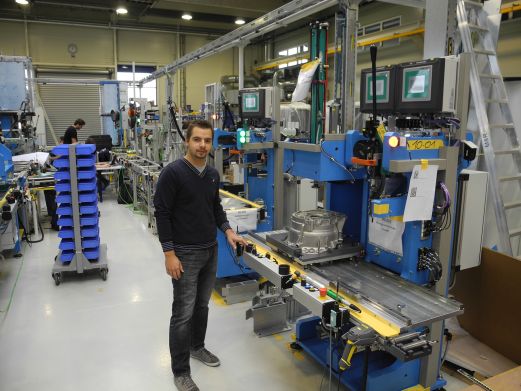
A mechatronics student, Sebastian Kos, opened his own company owing to his traineeship experience in Graz.
“MAMMA ERASMUS”
In 1969 Sofia Corradi, an Italian teacher and politician, designed the student exchange programme, today known as Erasmus. She advocated the programme for a long time in the university community and European institutions, until finally in 1987, she succeeded in her plans.
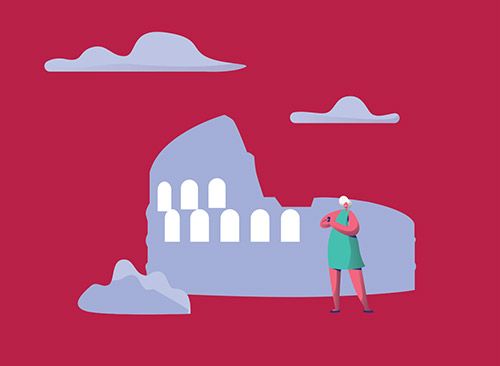
Innovations in education, a learning environment focused on children and their competences, and enhancing the competences of educators in early education and care are the guarantee for quality education.
READY FOR THE OCCUPATIONS OF THE FUTURE
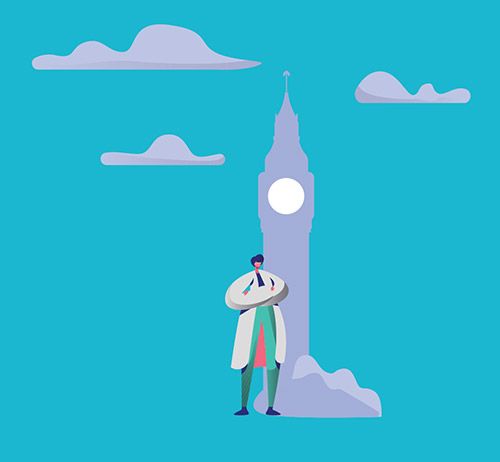
Programming is being taught already in kindergarten
The Petar Pan Pre-primary School in Zagreb decided to enhance the competences of their educators through a project ‘New knowledge and competences for the European kindergarten’ in 2014 and 2015. Nine employees learned about new education approaches, enhancing creativity, outdoor learning and using interactive media through five different professional training courses. They also learned about applied outdoor learning techniques, models focused on each child's individual learning possibilities and learning styles, and especially about the education of children with increased and creative abilities.
The gained new knowledge and insights were integrated into the kindergarten’s curriculum and the staff became the creators of their development and education. They presented new methods at workshops and lectures in their kindergarten and at numerous events in professional associations, local, regional and national events and conferences. In this way, they are striving to influence the process of changes in the Croatian education system and to adopt successful and innovative education practices from other European systems.
The aim of the project was, among other things, to improve the unique early learning programme of informatics they are carrying out, because, as they say, the first IT steps are taken already in the kindergarten. If you thought it meant that five-year-olds are sitting at their computers, you were mistaken – at Petar Pan programming is also taught outdoors!
Pre-schoolers are independently using different ICT tools, writing screenplays, making films, learning languages, and children with disabilities are equally involved in all programmes in this inclusive kindergarten.
|
Project ID |
|
|
Beneficiary |
The Petar Pan Pre-Primary School in Zagreb |
|
Project title and project number |
New knowledge and competences for the European kindergarten, 2014-1-HR01-KA101-000079 |
|
Programme field |
Erasmus+ KA1 Learning mobility of staff in school education |
|
Budget |
EUR 17,381 |
|
Implementation |
2014-2015 |
|
Link |
|
‘We want our staff to get the chance to learn about approaches and models focused on individual child learning possibilities and styles that integrate an innovative and natural learning environment.’
Marina Karavanić, the director of the Petar Pan Pre-Primary School
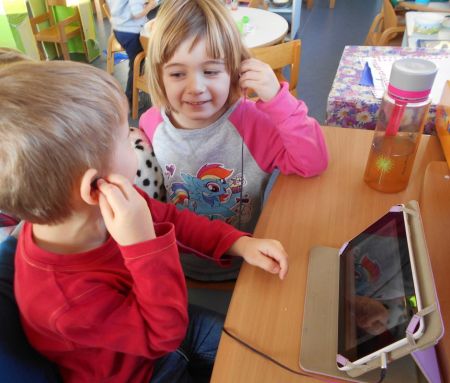
Children at Petar Pan independently use different ICT tools, write screenplays, make films and learn languages.
A school as a nursery of highly sought-after experts
The Buzet Secondary School knows from their own experience how important it is to provide vocational pupils with quality training using modern technology. In 2015, the school started participating in the Erasmus+ programme and today this school is a nursery of experts and an attractive educational choice among pupils. The school’s good results have also been noticed by the local community. The Town of Buzet helped in the procurement of 3D printers and scanning devices, and businessmen when hiring employees give priority to candidates with certificates from that school. The world-famous Rimac Automobili company also heard of the school’s good results and gave a pupil from the school the opportunity to professionally develop his skills during a summer traineeship.
The Buzet Secondary School acquired its first experience in the Erasmus+ programme through the project ‘CAD/CAM Technologies’, which was implemented during a two-year partnership with the Slovenian Secondary Technical School in Koper. In the state-of-the-art laboratories at the Koper Secondary Technical School, pupils from Buzet modelled in the SolidWorks computer programme, learned the basics of CAD-CAM turning and milling, worked with CNC machines and a 3D printer, cut plates with CNC plasma, and operated an arc and gas welding tool. They also operated arc-welding robots and gained many other useful skills. Due to the excellent results, the partnership between the two schools has continued.
‘The mentors from the Secondary Technical School in Koper and our teachers became good friends and fostered business relationships, which has resulted in another successful project – ‘Industrial Computers and Microcontrollers in Mechatronics’ which was implemented between 2017 and 2019. With the implementation of formal projects, we regularly organise social events for teachers as part of the school's sports and promotional activities,’ says the headmaster Margareta Gumilar.
After each mobility activity, pupils were awarded certificates from both schools and the Europass mobility document. Likewise, added value was provided through the use of ECVET, a European tool for the transfer, acquisition and recognition of skills and knowledge acquired in different systems and countries. Since the Buzet Secondary School recognises the knowledge, skills and traineeship gained through mobility activities in several subjects, in 2018 it received an award from the Agency for Mobility and EU Programmes for the project which most successfully implemented ECVET.
|
Project ID |
|
|
Beneficiary |
Buzet Secondary School |
|
Project title and project number |
CAD/CAM Technologies, 2015-1-HR01-KA102-012816 |
|
Programme field |
Erasmus+ KA1 Learning mobility of pupils and staff in VET |
|
Budget |
EUR 78,176 |
|
Implementation |
2015-2017 |
|
Link |
|
In the Buzet Secondary School they do not rest on their laurels. In the meantime, their third two-year Erasmus+ project in VET called ‘My future in my hands’, worth more than EUR 73,000, has been approved. This time the project was implemented together with a partner from Germany, and in addition to pupil mobility, the staff mobility is also planned. In the framework of the electronics programme, teachers will be trained in electronics, and in the smart vehicle programme, they will acquire knowledge in mechatronics and computing. In the Buzet Secondary School, they believe that the educated teachers will bring positive change to the school.
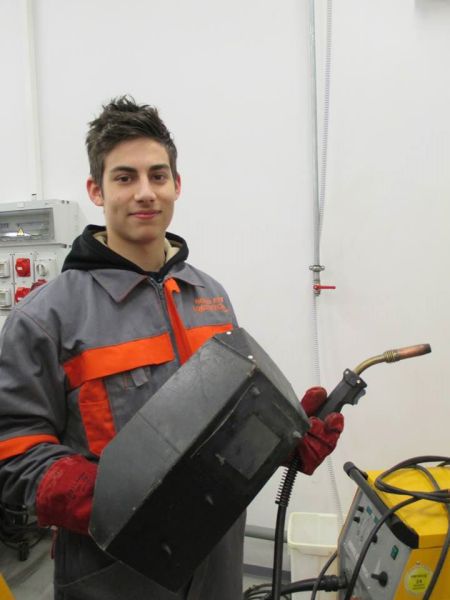
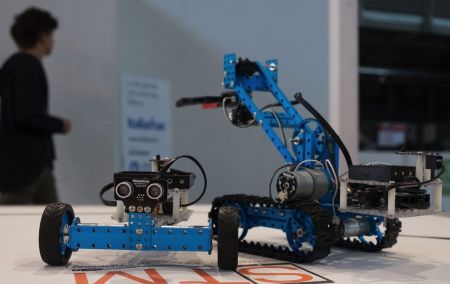
Pupils at Buzet Secondary School have, during their Erasmus+ traineeship, also worked with arc-welding robots and gained many other useful skills.
To pupils from Dubrovnik robotics is not a game but a profession
Due to the constant changes in the profession and the use of new technologies in the labour market, the Dubrovnik Maritime Technical School, in partnership with the Slovenian Ptuj School Centre in 2018 started a one-year project called ‘Cybernetic Advanced Technology – CAT’. Equipped with knowledge and experience in the use of modern technologies in the field of robotics, mechatronics and electrical engineering, Slovenian experts have empowered pupils and teachers from Dubrovnik with the knowledge and skills that have enriched their curriculum and made the school more attractive for prospective pupils.
Pupils learning the skills of the electrical engineers and computer technicians for the mechanical engineering professions participated in the project of making robots – from drawing and 3D computer printing of robot parts to assembly and programming. With the mentor’s help, pupils made a skeleton of a robot, shafts and other parts, then assembled components such as sensors, printed circuit boards to read the sensors and the power to the robot's mainboard and programmed it.
Their mechanical engineering teacher, Dalija Milić Kralj, worked on the robotic arm control and solar cell systems during the five-day training seminar. Encouraged by her Slovenian colleagues, she also designed a small wind turbine Savonius. She uses it in the teaching of renewable energy sources to demonstrate the conversion of wind energy into electricity. In this way, teaching becomes more attractive and theoretical content is less abstract to pupils.
In the framework of this project, the educational process has been modernised with the use of an upgradable robot, and teachers have been educated to work on more complex robotic structures. Apart from this, during the project, through the cooperation of Croatian and Slovenian teachers, a curriculum for robotics was developed, and the final version is being implemented. The school curriculum also integrated a new plan for a renewable energy sources’ workshop. At the same time, the school's reputation in the public has increased, and the school capacities for further implementation of international projects and the optional robotics classes at the school have been strengthened in order to provide new pupils with additional content. In December 2019, the school’s team participated for the first time in the RoboCup Junior Competition in Zagreb, which shows the pupils’ great interest.
‘Although my marks are not always the best, the teachers encouraged me to apply for a mobility activity and I didn’t regret it. I like to do practical things, and participating in such an activity has allowed me to put theory into practice, much easier than before. I have become more active, I participate in workshops for younger pupils, I am preparing for the competition, I am expanding my horizons. Participation also encouraged me to do practical work for the final exam,’ Nikola Handabaka, a fourth-year pupil in the vocational programme of computer engineering, says proudly.
‘In addition to the gained knowledge and new professional experience, I find it extremely valuable to share good practice with our Slovenian colleagues and the inspiration and motivation my first experience with Erasmus+ has given me. Most importantly, the project has had a positive impact on the participants, pupils, teachers and the school itself because it has contributed to its greater popularity and better reputation and it also increased the motivation to participate in projects.’
Dalija Milić Kralj, teacher of mechanical engineering
|
Project ID |
|
|
Beneficiary |
Dubrovnik Maritime Technical School |
|
Project title and project number |
Cybernetic Advanced Technology (CAT), 2018-1-HR01-KA102-047111 |
|
Programme field |
Erasmus+ KA1 Learning mobility of pupils and staff in VET |
|
Budget |
EUR 19,272 |
|
Implementation |
2018-2019 |
|
Link |
|

In December 2019, the Dubrovnik Maritime Technical School team participated in the RoboCup Junior Competition in Zagreb for the first time.
1 million Erasmus babies
It is estimated that more than a million children were born in relationships that started during an Erasmus programme.

YOUTH AT THE CENTRE OF POSITIVE CHANGE
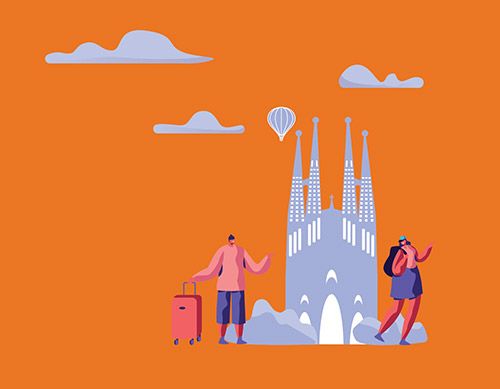
Youth workers are superheroes!
There are many challenges in the field of youth work – from digital literacy, unemployment and digital innovation to the standardisation of occupations. Therefore, a youth worker should have a set of skills regardless of the field in which the organisation he/she works for operates. One should know how to effectively communicate, motivate, provide psychological support, empower youth, use online tools, raise funds for projects and find partners to implement them. Such persons are in a word – superheroes!
In order to improve the field of youth work, in 2016, the Centre of Technical Culture Rijeka, together with partners from Italy, Lithuania and Latvia started the Erasmus+ project ‘Youth Work HD’. Together, they identified general skills and knowledge that could help standardise different types of youth work across Europe and conducted research among youth workers to further explore their work needs. Based on the given information, an online platform has been created where youth workers can learn together, participate in educational modules or create them, and share knowledge and skills.
It is an online platform through which, by following four courses, youth workers can develop their skills. In addition to communication skills, youth workers can also learn how to have an impact on the policy and how to work with key stakeholders. As this is an online course, the training is available in the five languages of the partner countries, and to a larger number of interested people. So far, more than 300 participants have enrolled in the online course.
Some of them point out that the information obtained is diverse and very useful for their further work. Also, as an advantage of online tools, they emphasise the ability to choose the time to learn and complete the tasks, as well as communication with other course participants.
|
Project ID |
|
|
Beneficiary |
The Centre of Technical Culture (CTC) Rijeka |
|
Project title and project number |
Youth Work HD, 2016-2-HR01-KA205-022308 |
|
Programme field |
Erasmus+ KA2 Strategic partnerships for youth |
|
Partners |
European Grants International Academy Srls Unipersonale (Italy); Latvian Information and Communications Technology Association (Latvia); Langas į ateitį (Lithuania) |
|
Budget |
EUR 238,225 |
|
Implementation |
2016-2019 |
|
Link |
|
‘The impact we have achieved with this project has of course been to increase the work quality of youth workers. Likewise, due to the project, issues addressed by youth workers are presented to decision-makers at the local, national and international levels, both at events organised within the project and events presenting the project’s activities and results.’
Hana Galogaža Lanča, CTC Rijeka
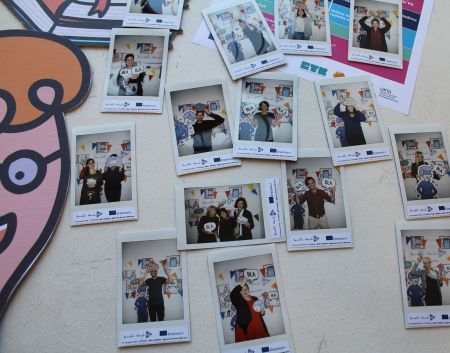
Persons who work successfully with young people are superheroes because they should have a set of skills regardless of the field in which they work.
The European value of youth work in the local community
The Agency for Mobility and EU Programmes, as a project partner and beneficiary of EU funds, also has an impact on the development of youth work, which is seen best in the project ‘Europe Goes Local – Supporting Youth Work at the Municipal Level’. Currently, it is the largest European project in the field of youth work and it aims to raise the quality of youth work at the local level. The project has been implemented since 2016 with financial support from the Erasmus+ programme in the youth field. The project is the outcome of the Erasmus+ national agencies network initiative, based on the conclusions of the 2nd European Convention on Youth Work and a set of the Council of Ministers’ recommendations, according to which local government units are the first and most important pillar in the administrative and political structure of youth work. It is emphasised that special attention should be paid to the stronger development of local youth work. Currently, 24 Erasmus+ agencies and key European institutions active in the field of youth are participating in the project (EU-CoE youth partnership, European Youth Forum and two European networks POYWE – Professional Open Youth Work Europe and the InterCity Youth Network).
So far, the greatest achievement of the project has been the creation of a European Charter on Local Youth Work, which is a framework for everyday work with the population in question and a link between policy and practice. The Charter is important to all stakeholders in the field of youth work and is also an excellent starting point for all local and regional government units wanting to enhance youth work in their communities. In further project implementation, a database of stakeholders operating in line with the Charter’s principles will be developed to set an example for other cities and municipalities.
In Croatia, in the first project phase, 11 municipalities and cities participated in the project – Opuzen, Đakovo, Pregrada, Rijeka, Rovinj, Sisak, Varaždin, Velika Gorica, Lovran, Tisno and Velika Kopanica. Each local government unit has developed its own development plan for youth work. Despite the differences in the scope and size of the change, there has been progress in all communities in developing an environment of support for youth. Some of these have served as examples of good practice. Among the project results are the possibility of including a provision for youth in the local budget of Opuzen, introducing a participatory budget for youth in Pregrada, employing a person to coordinate local youth work in the city government in Rijeka, improving the work of the Youth Centre in Varaždin and improving local youth work through EU mechanisms in Velika Gorica.
In the second phase, which began in November 2019, the representatives of 17 other municipalities, cities and counties from all over Croatia participate in the project. This interest shows that the local and regional government units have accepted the project which has enabled the further development of youth work at the local level.
|
Project ID |
|
|
Beneficiary |
Erasmus+ national agencies in the youth field |
|
Project title and project number |
Europe Goes Local – Supporting Youth Work at the Municipal Level |
|
Programme field |
Erasmus+ Transnational cooperation |
|
Partners |
200 organisations across Europe |
|
Implementation |
2016 – … |
|
Link |
|
‘I am extremely grateful on my own behalf and on behalf of the Town of Ozalj for being able to participate in this project. The field of youth work is very important for every local government unit. Therefore, we have tried so far to reach the youth in various ways, to involve them in the active life of the community, but it was all spontaneous. I expect that this project will assist us in acquiring specific knowledge, skills and tools to ensure that this work is of high quality and beneficial to the youth and the community,’
Gordana Lipšinić, the Mayoress of Ozalj
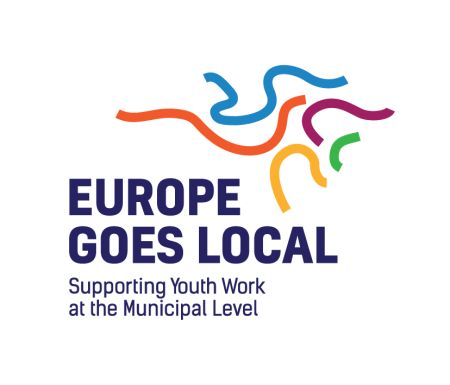
With the largest European youth work project, ‘Europe Goes Local’, all local and regional government units have been given the opportunity to improve youth work in their communities.
Establishing the Youth Centre in Split with persistence and dialogue
The social importance of youth comes from their potential, which needs to be realised while they are young, without delay for the future. As a result, the Info Zone Association of Split submitted the project ‘Structured Dialogue to a Quality Youth Centre’ and, with just under HRK 40,000, it began the fight to improve the quality of youth life in Split and its surroundings.
During the seven-month project work, the association succeeded in creating a framework for defining activities and services and a model for managing the future Youth Centre. The Centre included youth, experts in youth work, representatives of public bodies responsible for youth, and policymakers from the entire Split region, where young people gravitating to Split live, in surveys, meetings, discussions and a conference.
The project also prepared a publication listing the experiences of ten youth centres in Croatia and other European countries. It is a useful source of information for improving existing and establishing new youth centres not only in Split but also in other cities.
The results of the project and the conclusions of the participants in the structured dialogue were presented at a meeting of the City Youth Council, attended by its members and representatives of youth associations, as well as the mayor with associates and city councillors. The Info Zone thus additionally confirmed its competences and role in the development of the Youth Centre in Split, so the City of Split included it in the call for new project ideas regarding the Youth Centre, which are expected to be implemented within the Youth Centre.
|
Project ID |
|
|
Beneficiary |
Info Zone, Split |
|
Project title and project number |
Structured Dialogue to a Quality Youth Centre (KA3) 2018-2-HR01-KA347-047595 |
|
Programme field |
Erasmus+ KA3 Youth Dialogue |
|
Budget |
EUR 5,005.29 |
|
Implementation |
August 2018 - February 2019 |
|
Link |
|
‘The Youth Centre will be a generator of a better quality dialogue between the youth and other social stakeholders. A safe and adequate workspace will encourage more young people to be active citizens, to become better informed and to improve the quality of leisure time. All this will lead to higher levels of knowledge, skills and employability of young people.’
Goran Biličić, Info zone
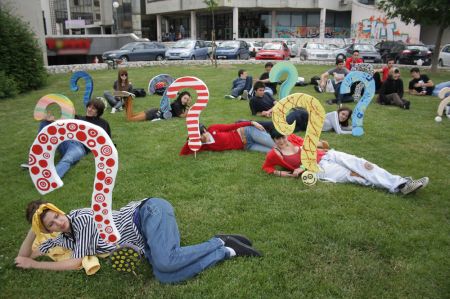
The youth in Split have wanted their own workspace since 2006!
The invaluable contribution of volunteering in rural communities
Activities involving volunteers from the Eco Centre Latinovac brought Europe and the world to Latinovac, a small village with only 60 elderly inhabitants who are always cheerful to see young people and interesting events.
At the end of 2018, the Erasmus+ ‘Wealth in Diversity’ volunteering project was implemented in Latinovac and other parts of Požega-Slavonia County. Ten young volunteers, four with fewer opportunities, from Croatia, France, Greece, Italy, Portugal, Spain and Latvia participated in the project.
During the two months, the volunteers learned a lot about the environmental and sustainable way of life in the rural area, and at the same time, they shared some of their customs with some of the inhabitants of Latinovac and the surrounding area. For example, volunteers maintained two farms, participated in culinary workshops, spent three days in the woods to learn orientation and nature skills, visited Osijek and the Iskra Waldorf Initiative association, participated in the Mushroom Fair in Buk and the Flavours of Autumn in Požega where they held creative and sports workshops for children.
The greatest contribution of the project to the local community was the involvement of schools for the first time since the Eco Centre Latinovac has been implementing volunteering projects. Volunteers held a series of workshops in primary schools in Pleternica, Požega, Trenkovo, Čaglin, Jakšić and Kaptol, and in the regional schools of Mihaljevci and Podgorje. The pupils from the regional school in Alilovci also participated in them. In these workshops, the pupils learned about different cultures through fun and interactive games.
The feedback from the schools was excellent. The pupils were extremely interested in communicating with volunteers from foreign countries. For example, one sixth-grader from the primary school in Pleternica said that for the first time in his life he saw foreigners speaking English.
The volunteers also had a positive impact on other inhabitants of Latinovac and its surroundings. Just by staying in this area, the volunteers made it possible for the locals to get to know other cultures and contribute to the reduction of prejudice. Among volunteers, there were several people with fewer opportunities so the project also had an inclusive component. The participants learned a lot, and the acquisition of knowledge and skills through the participation in a variety of activities contributed to the successful non-formal learning process for which they received a Youthpass certificate.
The Eco Centre Latinovac has been implementing these and similar projects since 2012. During that time, it has implemented around 15 projects and hosted more than a hundred volunteers who have enriched the life of the local community through various activities.
|
Project ID |
|
|
Beneficiary |
Eco Centre Latinovac |
|
Project title and project number |
Wealth in Diversity, 2018-2-HR01-KA125-047555 |
|
Programme field |
Erasmus+ KA1 Learning mobility of youth (volunteering project) |
|
Partner countries |
France, Greece, Spain, Portugal, Latvia |
|
Budget |
EUR 16,419 |
|
Implementation |
2018 |
|
Link |
|
‘We want to revive a small rural community where there are few activities for children, youth and adults. We are trying through our work and with the help and support of volunteers, who come with their knowledge, experience and desire to work and contribute to the prosperity of the community, to organise activities throughout the year and enrich the lives of the local community.’
Danijela Beretin, Eco Centre Latinovac
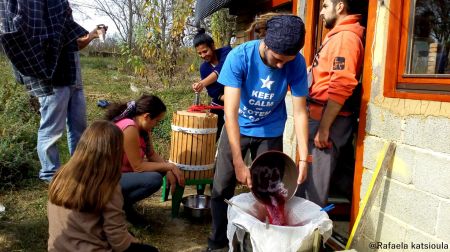
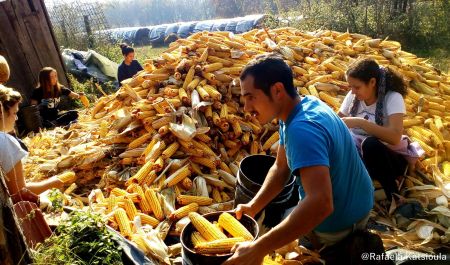
During the two months, the foreign volunteers learned a lot about the environmental and sustainable way of life in the rural area .
In the United Nations Declaration of 2000, solidarity was recognised as a basic universal value on which relations between people and nations must be based in order to jointly address economic, social, cultural and humanitarian problems and crises.
EUROPEAN SOLIDARITY CORPS
In 2018, the European Parliament and the Council adopted the Regulation on the European Solidarity Corps for the period 2018-2020, for which EUR 340 million has been allocated at the European level to enable 100,000 young people to participate in solidarity projects. The programme was created as a replacement and an upgrade of the European Voluntary Service.
More than 200,000 volunteers are registered on the online platform of the European Solidarity Corps and among them more than 1,400 volunteers are from Croatia. Almost 7,000 organisations across Europe are registered to implement the activities of volunteering, traineeship and employment under the European Solidarity Corps.
SOLIDARITY KEEPS A COMMUNITY TOGETHER
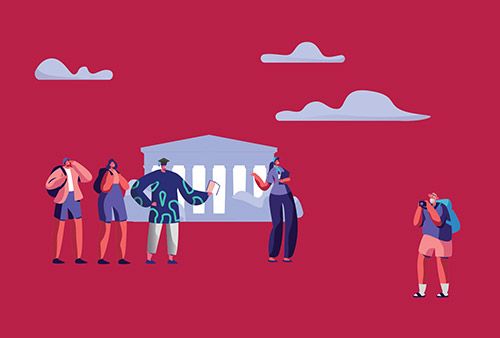
Volunteering is beneficial not only for society but also for the health and career of volunteers
Scientific research has shown that volunteering has a positive impact on the health, social relationships and successful careers of individuals, says Patrycja Pieniazek, a Polish woman with a Master's Degree in Croatology, who came to Zagreb to volunteer at the O.A.ZA. Association. In the meantime, she was promoted to project writing assistant. She wants to stay in Croatia and motivate youth to volunteer more because socially useful work helps community development and personal growth.
She warns that in Croatia people often volunteer because they do not have a job, so by volunteering they try to get a job or improve their CV.
In the framework of the one-year project ‘Green Fingers – Little School Gardeners’, O.A.ZA., with the help of young volunteers from five countries, showed children the benefits of being in nature by including them in urban gardening. Foreign volunteers arrived in Zagreb with the help of the European Solidarity Corps programme and actively participated in workshops for schoolchildren on waste sorting, environmental pollution and the importance of recycling, as well as various sports activities. Participation in the project encouraged some of the volunteers to start similar environmental initiatives in their local communities or to maintain their own urban gardens. A primary school in Zagreb, inspired by the garden it created together with international volunteers, has set up a school cooperative which produces decorations and cosmetics.
The best thing about the sustainability of that project is that, in 2019, O.A.ZA. expanded its cooperation to Petrinja and its surroundings and popularised ecology and gardening in schools there. Taking into account that sustainable development is a process of improving human life within the ecosystem capacity, the Green Fingers project and its long-term impact on the participating schools and pupils will be addressed by a psychology student at the Faculty of Humanities and Social Sciences in Zagreb in her thesis.
How pupils are satisfied with the project is best seen in the statement of the eight-year-old Mihael who said that he had a hundred times more fun in the garden than when playing computer games..
‘Volunteering raises self-esteem and satisfaction with life, helps to create more and stronger social relationships and gains many skills such as teamwork, communication and language skills. This increases employment possibilities because employers are looking for proactive people who have more than just a university degree,’ explains Patrycja.
|
Project ID |
|
|
Beneficiary |
O.A.ZA. Association, Zagreb |
|
Project title and project number |
Green Fingers – Little School Gardeners, 2016-3-HR01-KA105-034854 |
|
Programme field |
Erasmus+ KA1 Learning mobility of youth (volunteering project) |
|
Partner volunteering countries |
The Republic of North Macedonia, Portugal, Greece, Italy and Serbia |
|
Budget |
EUR 20,106 |
|
Implementation |
2017 |
|
Link |
|
‘I am happy working at a non-profit organisation like O.A.ZA. because my work and effort indirectly enrich somebody’s life with knowledge, experience, skills ...’
Patrycja Pieniazek, project writing assistant, O.A.ZA. Association
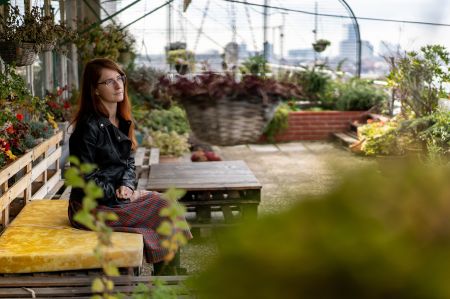
‘Thanks to the European Solidarity Corps programme, volunteers have travel, accommodation and food costs covered and receive mentoring support,’ says Patrycja.
Roma youth in the service of the community
The Roma National Council (RNC) has launched a solidarity project called ‘Roma youth in the service of the community’, in which a group of young Roma girls and boys from the isolated, segregated Roma settlement Piškorovec in Međimurje County, showed by their own example that positive changes within their local community are possible. In this community, the living conditions are extremely poor because people live there surrounded by waste and many are without electricity, water and a sewage system.
The Piškorovec settlement is one of 12 isolated Roma settlements in Međimurje County where spatial segregation is often emphasised as one of the main obstacles to integration into society. Due to their isolation from the majority of the population, Roma children cannot learn Croatian, so they are unprepared when starting school and achieve worse results, lose interest in learning and often leave school or discontinue education. Leaving school leads to unemployment and a difficult life, and the next step is often crime, which is unfortunately confirmed by the statistics. Certain Roma settlements, with Piškorovec being one of the most difficult cases, become externally and internally isolated communities where the security of residents is extremely poor.
Therefore, the above-mentioned group of young Roma girls and boys, led by Severina Oršuš, decided to tackle these problems. They carried out a series of activities to improve the personal, educational, social and civic status of Piškorovec residents and their ecological awareness, and to preserve the national and cultural identity in order to combat prejudice and discriminatory behaviour of the majority against the Roma minority.
In order to achieve better results in school, pupils were given assistants who helped them each week to learn and write homework, and teachers were provided with assistants to understand the Romany-Boyash language. During the summer holidays, extracurricular activities were organised, which included repeating the learned lessons, a swimming school and alike. In order to raise the environmental awareness of the residents, there were cleaning activities and the planting of flowers, fruit trees and other plants in the settlement. A waste sorting model presentation was also organised. As part of the project, pupils participated in the exploring and presentation of the characteristics of the Roma identity. Due to this, the idea arose for the production of a documentary called ‘Škarje moje malo’ which speaks about the history of Piškorovec and its Roma residents.
The film was created by a group of young Roma girls and boys with the help of a mentor, the social pedagogue, Maja Kutnjak Vrtarić, and was filmed in cooperation with the media group from the Tomaš Goričanec Primary School from Mala Subotica. The purpose of the film was to display and highlight the traditional and cultural values and the special talents and skills of Roma locals, in order to contribute to a better perception of the Roma with the public and to send a message to the Roma community that they can be proud of their Roma identity. The film ‘Škarje moje malo’ was voted the best documentary at the International Film Festival for the Children and Youth of the Mediterranean Countries, held in Dubrovnik in October 2019.
|
Project ID |
|
|
Beneficiary |
The Roma National Council |
|
Project title and project number |
Roma Youth in the service of the community, 2018-1-HR01-ESC31-060188 |
|
Programme field |
European Solidarity Corps; Solidarity project |
|
Budget |
EUR 8,088 |
|
Implementation |
2019 |
|
Link |
|
‘The support of the pupils and staff of the Tomaš Goričanec Primary School for the film ‘Škarje moje malo’ is an example of how schools can contribute to the well-being of the local community not only through their primary activity – educating children and youth – but also through other activities. The film also contributed to the reduction of the local population’s prejudices against their Roma neighbours by reminding them that they cooperated in the past.’
David Dragoljub Orlović, Executive Director of the Roma National Council
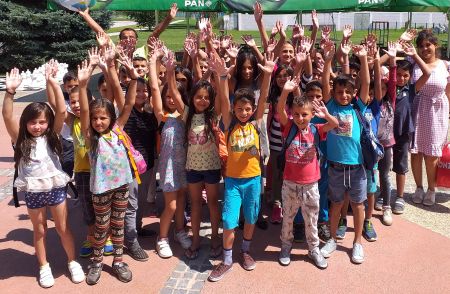
During the summer holidays, the Roma youth were happy to learn how to swim.
The youth of Europe for the well-being of the elderly in Poreč
When volunteering, we learn about ourselves and others, and volunteers are the wealth and strength of the community. This is what they believe in at the Home for the Elderly and Disabled in Poreč. Since 2014, they have been regularly applying for volunteering projects. Thanks to this approach, the home in Poreč is considered to be a stimulating volunteer environment that promotes intergenerational solidarity, the informal learning about working with the elderly and intercultural dialogue. Previously, young volunteers arrived at the Poreč Home for the Elderly and Disabled under the European Voluntary Service, and since 2018 they have been part of the European Solidarity Corps programme.
During the ‘Youth of Europe for the Elderly and Disabled of Poreč’ project, eight European volunteers organised 30 hours of quality leisure time per week for the residents of the home. According to their own abilities and interests, each of the residents participated in various creative and fun activities such as dance, song, board games, walking in the fresh air, plus all the other activities that have a positive impact on physical and mental health. It is especially important to emphasise that volunteering also improved the mood of the elderly, which made them feel less sad and neglected. Nevertheless, the young volunteers were also happy to exchange life experience with the elderly and witnessed directly how an institution for the elderly and disabled functions, and how important intergenerational solidarity is. In addition to this, during their stay in Poreč, the volunteers got to know the wider community and its customs, the Croatian language and other young people in Poreč and the surroundings.
‘A big thank you to all the volunteers who volunteered at the Home and dedicated their time, effort and talents to its beneficiaries. The value of the hours they spent at the Home in various activities is immense because they have made the beneficiaries' lives more beautiful, richer and better. We try to make our positive experience with young volunteers from Europe as inspiring as possible for the community. Hence, we participated in the ‘Volunteering to go’ project, which aims to bring together all the work opportunities for the common good in our local community and to encourage young people from Poreč to volunteer. Our target group is secondary school pupils who are presented with volunteering opportunities at the Home and the opportunities offered to youth under 30 in the framework of the Erasmus+ and the European Solidarity Corps programmes,’ said social worker, Edita Tavra.
|
Project ID |
|
|
Beneficiary |
The Poreč Home for the Elderly and Disabled |
|
Project title and project number |
The Youth of Europe for the Elderly and Disabled of Poreč, 2018-2-HR01-KA125-047558 |
|
Programme field |
Erasmus+ KA1 Learning mobility of youth (volunteering project) |
|
Partners |
Scambieuropei (Italy); Federación de Asociaciones Juveniles de Gijón (Spain) |
|
Budget |
EUR 16,295 |
|
Implementation |
2018-2019 |
|
Link |
|
‘Volunteers who, through their selfless work help others, those who need help, while asking nothing in return, make our town a nicer, better and safer place to live.’
Loris Peršurić, the Mayor of Poreč

Volunteering also improved the mood of the elderly.
THE EUROPEAN ENVIRONMENTAL CHALLENGE
Becoming the world's first climate-neutral continent by 2050 is the greatest challenge and opportunity of today. With this in mind, the European Commission has presented The European Green Deal – the most ambitious set of measures that should allow citizens and businesses in Europe to benefit from a sustainable green transition.
TOWARDS A GREEN EUROPE
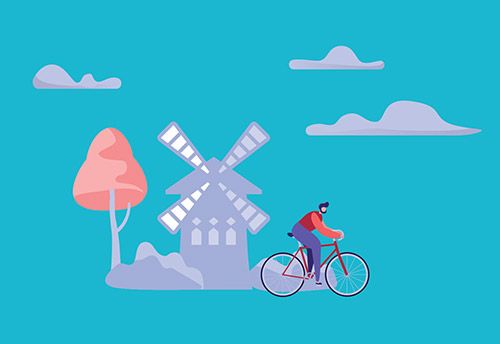
The school as a place of innovative solutions to the environmental challenges of today
‘Learning E-Mobility’ (LEMO) is one of the first projects of international mobility in the Croatian education system which at the same time popularises the awareness of the use of renewable sources in all transport types and educates the youth to be the leaders of change. In 2014, the School for Road Traffic and Transportation started this three-year project in the framework of the Erasmus+ programme in cooperation with partners from home and abroad with the aim of improving vocational education.
One of the most important project outcomes is, without doubt, the introduction of the optional subject of electromobility into the school curriculum. Due to this, pupils acquire knowledge about electric vehicles, participate in electromobility events, broaden their horizons and become motivated to study electromobility further, continue their education and connect with potential employers. Each year, a dozen pupils complete their education as road traffic technicians preparing and presenting their theses about electromobility. Likewise, pupils became more aware of the importance of using electricity in road transport and its environmental impact. Pupils and teachers have shown how seriously they think about using electric vehicles by transforming a classic car into an electric car. They also decided to build a solar power plant that would power an electric vehicle charging station.
The importance of the LEMO project has also been recognised on the European level. As a result, new strategic partnerships with vocational schools and colleges in Germany, Italy, Poland, France, Austria and Lithuania were formed. They learn from partners about innovative learning models and applications of digital content in the field of electromobility and motor vehicle telematics in vocational and higher education.
Due to its proactive and innovative approach, this school has become a great example of the successful upgrading of vocational education by monitoring advanced technologies, sharing good practices and trends in the labour market. Previously, their projects were funded through the Lifelong Learning Programme (‘Europe Electric Car’), whereas today through the Erasmus+ programme. Since 2016, the school holds the Erasmus+ Vocational Education and Training Mobility Charter and is the Erasmus+ Ambassador. The school also shares the knowledge willingly with everyone who turns to it for help.
‘The VET Charter is an incentive for us to think strategically about change and to integrate it in the school’s development goals, bearing in mind the degree to which internationalisation will be integrated into the curriculum. One of the aims is to prepare pupils so that they can participate under equal terms in the European and world labour markets. We have created a wide network of partners that enables our pupils and teachers to gain international experience, learn, exchange ideas and good practices not only in mobility projects but also in strategic partnerships,’ says Snježana Kovač, the project coordinator.
|
Project ID |
|
|
Beneficiary |
The School for Road Traffic and Transportation |
|
Project title and project number |
Learning E-Mobility (LEMO), 2014-1-HR01-KA202-007148 |
|
Progamme field |
Erasmus+ KA2 Strategic partnership in VET |
|
Partners |
The Kouvola Region Vocational College (Finland); Celje School Centre (Slovenia); Energy Institute Hrvoje Požar (Croatia); Avantcar (Slovenia); Ducati komponenti (Croatia); Neteko (Croatia); Automobil Club Assistencia SA – Acasa (Spain) |
|
Budget |
EUR 260,217 |
|
Implementation |
2014-2017 |
|
Link |
|
‘During the transformation of the car, we became fully aware of the problems regarding electric cars, their possibilities and limitations. Participation in the project opened the way to new insights into the developments in the global car market and their implications for road transport and the environment. The experience we have gained is invaluable because we can easily detect changes in the economy and transport, and, as an educational institution, adapt to them better.’
Snježana Kovač, the school psychologist and project coordinator
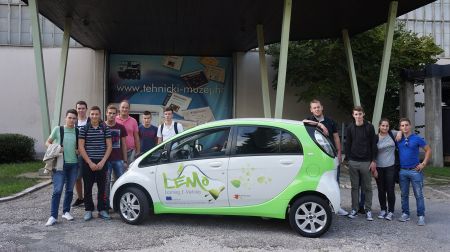
Pupils and teachers transformed a classic car into an electric car.
STEM offers solutions to pollution!
A two-year project called ‘Pollution! Find a STEM solution!’ of the Pantovčak Primary School in Zagreb is a best practice example of a strategic partnership, a special form of partnership in the Erasmus+ programme that fosters innovation in education. Thanks to this, the pupils realised how knowledge in the area of STEM is useful, practical and applicable in their daily lives.
Created in response to the need for further development of skills in STEM subjects and new technologies, the project has, through various activities, contributed to the increased interest of pupils in STEM subjects and introduced them to the new trends in communications, technology and science.
The results of the project, which brought together five schools from Spain, the Czech Republic, Poland, France and Croatia – activity descriptions, worksheets, work guidelines, pollution measurement programme and alike – are presented on the project’s website and can be downloaded and used in teaching.
Primary school pupils aged 11 to 15 learned about many of the web 2.0 tools and used them, programmed, learned to recycle, etc. They assembled a robot themselves and used it to measure the sound and light pollution and air quality at school. Likewise, by learning to produce eco-friendly cleaning products, the pupils learned about pollution and environmental protection. By visiting the Orli Staw waste sorting plant, they learned about the importance of recycling and the application of technological innovations in the fields of environmental protection and sustainable development.
In the framework of the project, pupils met the programme developer and author of the iPad games, special effects programmer in films and cartoons, digital marketing expert and space technology engineer who controls the instruments at the international space station, ISS. They provided them with useful information about the skills needed for these jobs as well as the jobs of the future.
Developing critical thinking and STEM competences, the young scientists attempted to find solutions to real-world problems with this project, which was proclaimed a European example of a success story.
|
Project ID |
|
|
Beneficiary |
The Pantovčak Primary School Zagreb |
|
Project title and project number |
Pollution! Find a STEM solution!, 2014-1-HR01-KA201-007149 |
|
Programme field |
Erasmus+ KA2 Strategic partnership in school education |
|
Partners |
The Collège Edouard Herriot (France); the Kalisz Primary and Secondary School (Poland); the Kladno Primary School and Kindergarten (the Czech Republic); Institute Ferran Tallada (Spain) |
|
Budget |
EUR 30,940 |
|
Implementation |
2014-2016 |
|
Link |
|
‘This project has been an exciting and interesting experience for us. We learned how to programme a robot, how to use various web tools, and we also improved our presentation skills. But most importantly, we met a lot of interesting people who showed us their customs and we became friends. We sincerely hope that in secondary school we will be part of a similar project and that we will be able to continue widening our horizons. We also hope to have teachers like these who will help us expand our knowledge.’
Petra Ivanović and Bruna Mioč, pupils

Pupils learned how to make organic cosmetics on their own during the project.
According to Eurostat data, in the European Union by 2050 the number of inhabitants over the age of 85 will increase from the current 13.8 to 31.8 million. In the same period, the number of people aged 100 will increase from 106,000 to 500,000. As human life extends, the elderly continue to be actively involved in the economy, and their longevity can, through lifelong learning, become a benefit to the whole of society.
GREY-HAIRED STUDENTS
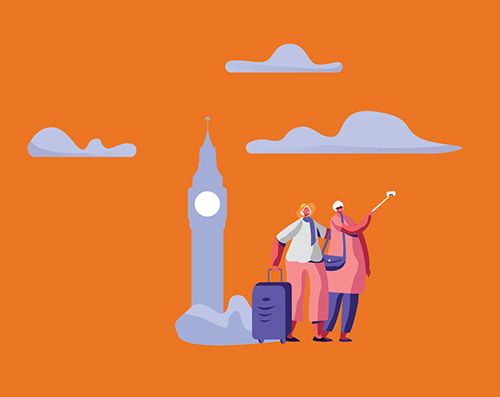
The centuries-old tradition of adult education
In the hundred years of its existence, since it was founded in 1907 by philosopher Dr Albert Bazala, the Public Open University Zagreb (POUZ) has been dedicated to implementing and promoting adult education. This adult education veteran has specially designed programmes for people over the age of 50 at the University of the Third Age.
Being aware of the situation in Croatia, where according to Eurostat data, only 3% of the population aged between 25 and 64 are enrolled in adult education programmes, POUZ has been involved in the implementation of European education programmes from the very beginning and has been a long-time Erasmus+ programme beneficiary and ambassador.
Through the Erasmus+ project ‘Digital Danube’, POUZ has focused on improving the andragogical and IT skills of its teaching staff needed in adult education. The long-term aim of the project partners is to involve the elderly in the Danube Region in education programmes, especially those promoting digital literacy. Through the exchange of ideas and good practices, the teaching staff have improved the skills of applying digital tools in teaching and they learned about new methods of teaching the elderly about the use of information and communication technologies in their daily lives.
As a guarantee of the project sustainability, partner organisations have continued their cooperation within the network Danube-Networkers for Europe (DANET), a European association that brings together educational institutions and experts to promote the education of the elderly in the Danube Region. Namely, POUZ states that there are more elderly participants interested in digital skills, especially communicating online and using smartphones. Since these participants are highly motivated to gain new knowledge and are very demanding with regard to the quality of teaching and lecturers, POUZ tries to meet their needs.
‘Approximately 11% of adults are enrolled in education programmes in the European Union, with the aim of at least 15%, which means that we are well behind the European average. With the help of the Erasmus+ programme, we need to train everyone, from programme providers, through organisers, to decision-makers. Otherwise, we could face big challenges in various fields: economic, social and political,’ warns Tihomir Žiljak, PhD, Head of the Department for Lifelong Learning, Development and EU Projects at POUZ.
|
Project ID |
|
|
Beneficiary |
Public Open University Zagreb |
|
Project title and project number |
Digital Danube, 2014-1-HR01-KA104-000131 |
|
Programme field |
Erasmus+ KA1 Learning mobility in adult education |
|
Partners |
Slovenian Third Age University (Slovenia); Ulm University (Germany); The University of Library Studies and Information Technologies (Bulgaria) |
|
Budget |
EUR 9,015 |
|
Implementation |
2014-2015 |
|
Link |
|
‘Erasmus+ helps us learn from others about how to solve problems, but also how to offer others our own solutions, given the rich experience of our institution.’
Tihomir Žiljak, PhD, a scientist with 40 years of experience in the field of adult education in Croatia
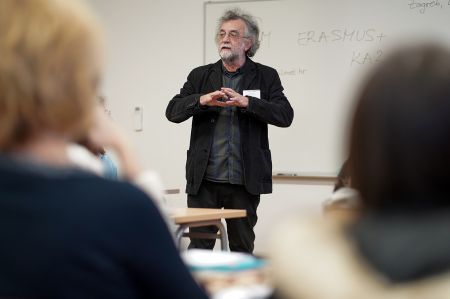
Tihomir Žiljak, PhD, Head of the Department for Lifelong Learning, Development and EU Projects at POUZ.
INSTEAD OF AN AFTERWORD
We were completing this publication at the time of the coronavirus pandemic outbreak. Although regular activities have been interrupted or postponed due to this situation, our beneficiaries have focused their knowledge and skills acquired through the Erasmus+ and the European Solidarity Corps programmes on socially beneficial projects, such as 3D printing of protective visors for healthcare professionals, solidary assistance to the elderly and sick, assistance to the victims of the Zagreb earthquake, organisation of online classes for students with developmental disabilities, online courses for pregnant women and many other solidary activities. In the midst of the corona crisis, particularly important were our eTwinning ambassadors who transferred their previously gained knowledge of online tools to their fellow teachers and supported them in conducting online classes.
Since we believe that positive stories about human solidarity and creativity can inspire individuals and organisations to take new acts of courage, we have launched an online campaign #StrongerTogether, which honours all our socially engaged beneficiaries.
We thank them for their selflessness and solidary help to those most in need!
Inspiring stories from the campaign #StrongerTogether are available on the website of the Agency for Mobility and EU Programmes here: https://www.mobilnost.hr/hr/sadrzaj/zajedno-smo-jaci/
Imprint
Publisher: Agency for Mobility and EU Programmes
For publisher: Antonija Gladović, MSc
Editors: Ljubica Petrović Baronica, Ivana Erceg Matijašević
Authors: Ivana Erceg Matijašević, Ivana Sokač Troha, Ivana Zima
Associates: employees of the Agency for Mobility and EU Programmes
Translator: Tihana Bagić
Proofreader: Martin Mayhew
Photos: Ivan Mijić / private photos
Design and graphic design: Ko:ke kreativna farma
Web Developer: Hajtek studio
ISBN 978-953-8160-11-0
Zagreb, 2020.
*This publication has been funded with support from the European Commission. This publication reflects the views of only the author, and the Commission cannot be held responsible for any use which may be made of the information contained therein.

